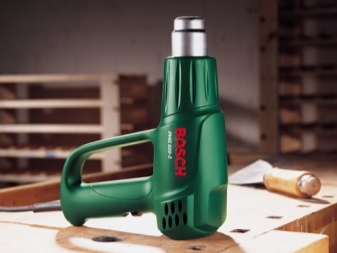Temperature of the construction hair dryer

The construction hair dryer is not only intended for removing old paintwork. Due to its heating properties, the device has a wider application. From the article you will find out what types of work that require heating can be done with a building hair dryer.


What can it give out?
The construction hair dryer is also called technical or industrial. All this is one and the same design, the principle of which is based on forcing a stream of hot air and directing the flow to the desired object. Depending on the characteristics of the temperature regime, the scope of the device is determined. The hot air gun heats up depending on the parameters set by the manufacturer. The minimum mark is 50 degrees Celsius, the maximum at the exit can reach up to 800 degrees. Most models have a maximum permissible temperature of 600-650 degrees. If you need a hair dryer for only one type of work, for example, to remove paint and varnish, then get a simple single-mode hot air gun.
But if you plan to have a device of this type at home for different types of work with different materials, then purchase a device that has a temperature adjustment mechanism or different modes. In the first case, this is a more accurate (smooth) setting. It can be set both mechanically (manually) and using electronic control. The operating mode of the hot air gun depends on the selected position, for example, there are devices with step switching from 300 degrees to 600. Some models "remember" the parameters of temperature modes - and then turn on the desired option automatically.
A construction hair dryer can produce not only high temperatures, but also a lower one, for example, working on only one fan. Without using a heating mechanism, you can quickly cool the tool, various parts, etc.


Types of work taking into account the heating temperature
Consider the types of work that can be performed at different temperature levels. Here's what you can do when the hot air gun heats up to 450 degrees:
- dry wet wood and paints and varnishes;
- disconnect adhesive joints;
- to make varnishing of parts;
- remove labels and other stickers;
- wax;
- form pipe joints and synthetic materials;
- freeze door locks, car doors, water pipes;
- use when defrosting refrigerating chambers and in other cases.



For plexiglass and acrylic, you need to set the temperature to 500 degrees. In this mode, they work with polyurethane pipes. And here is how you can use a hot air gun when it heats up to 600 degrees:
- carry out welding work with synthetic materials;
- solder with soft solder;
- remove stubborn layers of oil paint and varnish;
- use when processing heat-shrinkable items;
- use when loosening rusty adhesions (removing nuts, bolts).


The range of application of the hot air gun is quite extensive. In addition to the indicated work, a lot of other manipulations can be made, for example, to solder pipes with tin or silver solder (at a temperature of 400 degrees). You can dry the joints of tiles, putty, disinfect wood by destroying ants, beetles and other microorganisms that like to settle in wood. Such a tool will come in handy in winter for clearing ice from steps and so on.Each manufacturer of industrial hair dryers gives instructions on how to use the technical device. Therefore, the first step is to look there in order to be guided by the recommendations of the device manufacturer.
During operation, it should be borne in mind that most often such devices break down precisely because of overheating. The hot thermoelement becomes brittle and can break from a fall or a small blow, therefore, after the end of the work, the hairdryer is placed on a special stand, or you can hang it on a hook for cooling. This device is classified as a fire hazardous category, therefore, when working with it at any temperature, fire safety requirements must be observed: first of all, do not use it near flammable objects and liquids.
If you follow all the rules and recommendations of the manufacturer, then a cheap hair dryer will last longer.















The comment was sent successfully.